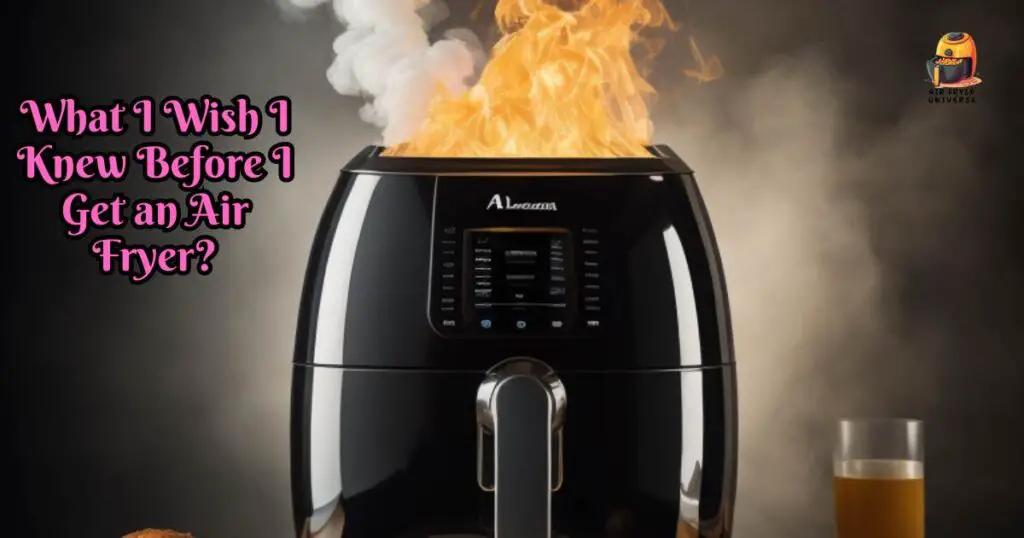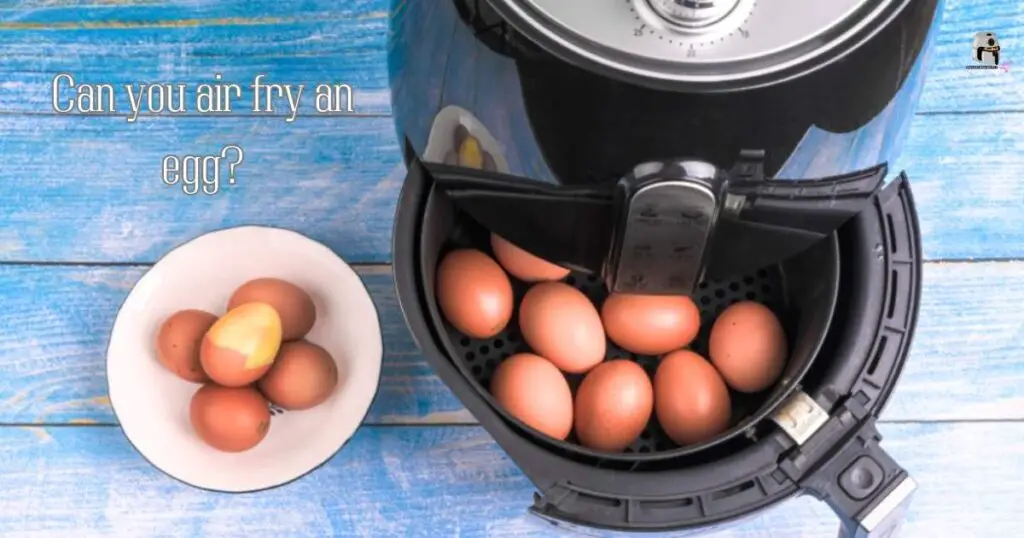Table Of Contents
Before you start using an air fryer, you should know some things. Air fryers are popular because they can cook food healthier and crispy, but there’s more to it.
In this article, we’ll give you advice and tips to make using your air fryer easier. We’ll discuss cooking times, choosing the right air fryer, and more. These tips will help you get the most out of your air fryer and improve your cooking experience immediately.

What I Wish I Knew Before I Get an Air Fryer
Here are some key points on what you might wish you knew before getting an air fryer:
Cooking Times Vary
Air fryers have different cooking times compared to traditional methods. The circulating hot air cooks food faster, so be prepared for some trial and error when adapting your favorite recipes. Keep an eye on your dishes to ensure they don’t overcook or undercook in the air fryer’s unique cooking environment.
Size Matters
The size of your air fryer can significantly impact your cooking experience. Smaller models are suitable for singles or couples with limited kitchen space, while larger ones are ideal for families or batch cooking. Consider your kitchen setup and cooking needs when choosing the right size to make the most of your air fryer.
Preheating Helps
Preheating your air fryer for a few minutes before cooking can significantly improve your culinary results. It creates an optimal cooking environment by ensuring the cooking chamber is at the right starting temperature. This is especially beneficial for recipes that require a crispy texture, making preheating a helpful step in air frying.
Oil Is Still Needed
Despite being a healthier cooking method, air frying often benefits from a small amount of oil. A light coating of oil on food can enhance texture and flavor. While it’s less oil than deep frying, it still contributes to achieving that golden, crispy finish on your favorite dishes in the air fryer.
Food Arrangement Matters
How you arrange food in your air fryer is crucial for even cooking. Place your food in a single layer to ensure consistent results, allowing air to circulate around each piece. Avoid overcrowding the basket or tray, as this can lead to uneven cooking and prevent your dishes from reaching their full potential.
Check and Shake
Checking and shaking the basket or tray during cooking is an important practice when using an air fryer. This simple step ensures even cooking and prevents food from sticking to the basket. Periodically opening the air fryer and gently shaking the contents helps achieve that crispy, evenly browned texture.
Cleaning Can Be Tricky
Cleaning an air fryer can be challenging due to its multiple components. You’ll typically need to clean the basket or tray, the inner tray or grate, and sometimes the heating element. Each part may require a different cleaning method, so be prepared for some maintenance to keep your air fryer in top shape.
Experiment and Have Fun
Air fryers offer versatility in the kitchen, so don’t hesitate to experiment and have fun with your cooking. Try new recipes, explore different cooking techniques, and discover unique flavors. Whether roasting, baking, grilling, or frying, the air fryer can be a creative tool for culinary adventures.
Read the Manual
Reading the user manual that comes with your air fryer is essential. Each air fryer model can have unique features, settings, and safety instructions. Understanding how to correctly operate and maintain your specific appliance ensures safe and effective use. It’s a small but crucial step in maximizing your air frying experience.
It’s Not Just for Frying
An air fryer isn’t limited to frying alone. It’s a versatile kitchen appliance capable of various cooking techniques. Beyond frying, you can roast vegetables, baking desserts, grilling meats, reheating leftovers, and much more. Explore the full range of possibilities to unleash the culinary potential of your air fryer.
Things to Consider Before Buying an Air Fryer
Here are some key points to consider before buying an air fryer:
Capacity
Capacity is a critical consideration when choosing an air fryer. Smaller models, suitable for individuals or couples, typically have a capacity of 2-3 quarts. Larger air fryers, with 5-6 quarts or more capacities, accommodate family-sized meals. Select a size that aligns with your household’s cooking needs and available kitchen space.
Wattage
Wattage in an air fryer impacts cooking speed and efficiency. Models with higher wattage, such as 1400 watts or more, tend to cook faster. This is essential for efficient and time-saving meal preparation. When choosing an air fryer, consider wattage to ensure it meets your cooking expectations.
Controls
Controls are a vital aspect of your air fryer’s usability. Look for models with user-friendly interfaces and digital displays for easy operation. Many air fryers come equipped with preset cooking options, simplifying the cooking process. Understanding and navigating the controls ensures a convenient and efficient cooking experience.
Temperature Range
The temperature range of an air fryer is a critical consideration for versatile cooking. Ensure the air fryer can reach temperatures suitable for various recipes, like baking, roasting, and air frying. A wide temperature range, typically between 100°F to 400°F (38°C to 204°C), offers flexibility and accommodates diverse culinary needs.
Space and Size
Measure your kitchen space to ensure the air fryer fits comfortably on your countertop or in your designated storage area. Consider the air fryer’s physical dimensions, such as 12 x 14 inches, and the available space, leaving at least 4 inches of clearance for safe and convenient operation.
Additional Functions
Additional functions in an air fryer can significantly enhance its versatility. Some models offer baking, grilling, and roasting tasks in addition to air frying. These extra features expand your cooking possibilities, allowing you to prepare a wider range of recipes and dishes with a single appliance, making it more multifunctional.
Price
Price is a crucial consideration when selecting an air fryer. These appliances come in a wide price range, from around $50 to $300 or more. Setting a budget helps narrow down options and find an air fryer that offers good value for your cooking needs, ensuring affordability and satisfaction.
Weight
The weight of an air fryer is a practical aspect to consider, especially if you plan to move it or store it in a cupboard. These appliances typically weigh between 10 to 20 pounds, with compact models being lighter and larger ones heavier. Choose a weight that suits your mobility and storage preferences.
Brand and Reviews
Brand and reviews play a crucial role in your air fryer selection—research reputable brands known for quality and reliability. Additionally, reading user reviews provides insights into real-world experiences. Consider both factors to make an informed decision and ensure your chosen air fryer meets performance and durability expectations.
Footprint
The footprint of an air fryer refers to the space it occupies on your kitchen countertop. Before purchasing, measure the area to ensure the air fryer fits comfortably without overcrowding your workspace. Consider the dimensions, typically around 12 x 14 inches, to maintain an organized and safe cooking environment.
Customer Support and Warranty
Customer support and warranty policies are essential when buying an air fryer. Choose a brand with reliable customer support for assistance and inquiries. Additionally, check the warranty to ensure you’re covered in case of defects or issues, providing peace of mind and long-term satisfaction with your purchase.
Ease of Cleaning
The ease of cleaning an air fryer is vital for convenient maintenance. Look for models with removable, dishwasher-safe parts, such as the basket and tray. This feature simplifies cleanup after cooking, saving you time and effort, and ensures that your air fryer remains in optimal condition for future use.
Noise Level
Noise level is worth considering when choosing an air fryer. While generally quieter than traditional deep fryers, some models may produce more noise than others during operation. Checking product reviews or asking about noise levels helps ensure a peaceful cooking experience, especially in quiet kitchen environments.
Safety Features
Safety features are essential in an air fryer to ensure worry-free operation. Look for models equipped with automatic shut-off capabilities to prevent overcooking or overheating. Cool-touch handles and exterior surfaces enhance safety by preventing burns when handling the air fryer during or after cooking, ensuring a secure cooking experience.
Read More:
Pros and Cons of an Air Fryer
Here are the pros and cons of using an air fryer:
Pros of an Air Fryer
- Healthier Cooking
Healthier cooking is a prominent benefit of using an air fryer. These appliances require minimal oil compared to traditional deep frying, resulting in lower calorie and fat content in dishes. Using hot air circulation, air fryers create a crispy texture while retaining the ingredients’ natural flavors, making them a healthier choice for fried foods.
- Versatile
Air fryers are incredibly versatile kitchen appliances. They excel at frying but can handle baking, roasting, grilling, and even reheating leftovers. Their ability to adapt to various cooking tasks makes them a valuable addition to any kitchen, allowing you to prepare a wide range of dishes with a single appliance.
- Time-Saving
Time-saving is a significant advantage of air fryers. These appliances cook food faster than conventional ovens or stovetop methods. Air fryers distribute heat evenly and efficiently using hot air circulation, reducing cooking times. This feature is precious for busy individuals looking to prepare meals quickly without compromising taste and texture.
- Crispy Texture
Air fryers excel at creating a crispy texture on a variety of foods. They use hot air circulation to cook and brown the outer layer, producing a satisfying, golden-brown crispiness. This makes air fryers ideal for dishes like French fries, chicken wings, and even certain desserts, delivering a delightful crunch.
- Easy Cleanup
Easy cleanup is a notable benefit of air fryers. Many models come with removable, dishwasher-safe parts, such as the cooking basket and tray. After cooking, these components can be easily removed and cleaned in a dishwasher or by hand, saving time and effort and ensuring a hassle-free post-cooking experience.
Cons of an Air Fryer
- Capacity Limitations
Capacity limitations are a drawback of air fryers. Even larger models may need to help accommodate large meals or families, necessitating multiple cooking batches. This can extend cooking time and cause inconvenience when preparing larger quantities of food. It’s essential to consider your cooking needs and the appliance’s capacity before use.
- Learning Curve
Using an air fryer involves a learning curve. Cooking times and temperatures may differ from traditional methods, requiring adjustment and experimentation. This learning process can lead to occasional overcooking or undercooking until you become accustomed to the appliance. However, with practice, you can master the art of air frying and achieve the desired results.
- Space Requirement
Air fryers require counter space, which can be a drawback in smaller kitchens. The appliance’s size and shape should fit comfortably on your countertop. Ensure you have sufficient space for the air fryer and the necessary clearance around it for safe and convenient operation.
- Noise
Noise can be a minor concern with air fryers. While generally quieter than deep fryers, the fan and heating element can produce noticeable sounds during operation. This noise level may not be suitable for quiet kitchen environments or if you prefer a noise-free cooking experience.
- Cost
The cost of an air fryer can be relatively high compared to other kitchen appliances. While this upfront investment can be a drawback, many users find that the long-term savings on cooking oil and the convenience of air frying justify the initial expense, making it a worthwhile investment for some.
FAQs
Is It Worth Getting an Air Fryer?
Yes, it’s worth getting an air fryer. This kitchen appliance provides a healthier alternative to deep frying, using minimal or no oil. It cooks food faster than traditional ovens, making it a valuable addition for quick, guilt-free meals.
Are Air Fryers Good for Beginners?
Yes, air fryers are good for beginners. They’re user-friendly, with straightforward controls and preset options, making cooking easier. Plus, their quick cooking times allow for faster meal preparation. They’re a great entry point for those new to cooking or looking to simplify their culinary adventures.
Final Verdict
The air fryer completely transforms kitchen cooking. It delivers healthier, crispy dishes with minimal oil, and its versatility is impressive. But here’s the scoop: expect a learning curve as you adjust to its quirks. Ensure you have the counter space and tolerance for a bit of noise.
And here’s some golden advice: preheat for better results, arrange food evenly, and clean up promptly. Don’t miss out on the full scoop in the article. It’s your ticket to becoming an air fryer pro, whipping up tastier, quicker, and healthier meals!
You May Also Like to Read:


